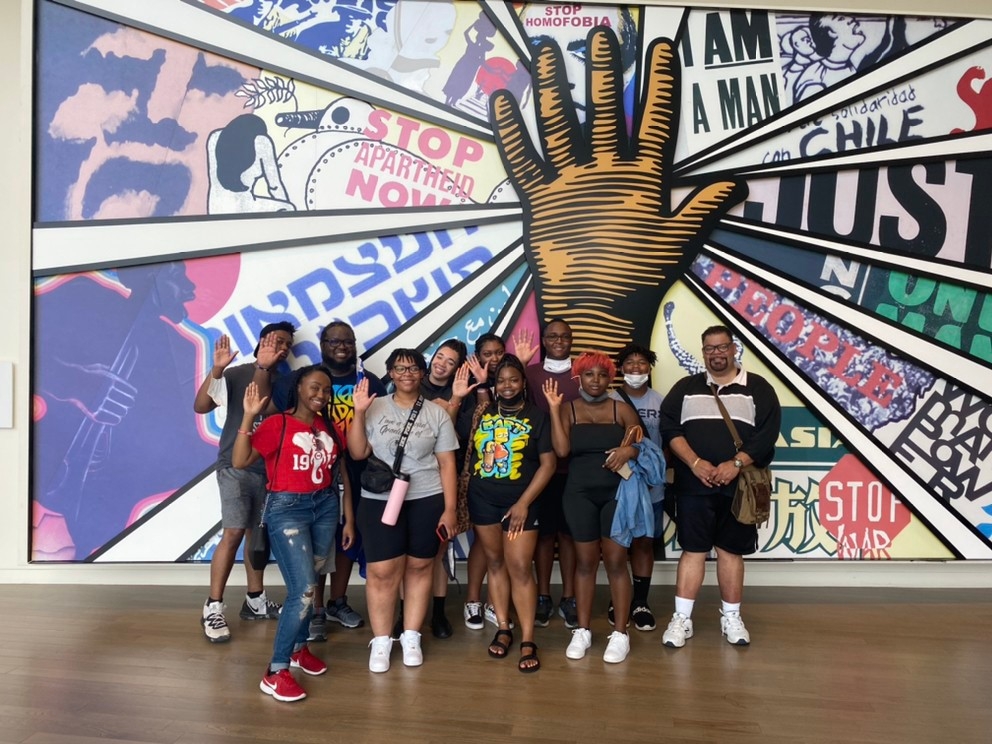
Darryl Peal went on a trip recently that served as a grim reminder of the tumultuous racial unrest of the U.S. while teaching him a hard lesson in the process.
“Freedom ain’t free,” he says.
This past July, eight Northern Kentucky University students and two staff members spent a week in the southern U.S. to learn about the Civil Rights movement, black suffrage and human rights in America thanks to the Office of African American Student Initiatives. Peal, chief diversity, equity and inclusion officer and Title IX coordinator for NKU, says the trip reminded him liberty came at a cost.
“And that cost was documented in every museum, in every presentation and in every state that we visited,” he says “It was not free.”
The trip was an integral part of BLS 494 Topics: Black Studies class, which began in 2020. As a part of the class, students spent their spring break heading to famous historical locations such as Birmingham, Alabama, Atlanta and Savannah, Georgia, instead of spending time in their rooms back home.
Carlous Yates, the former director of NKU’s African American Student Initiatives and architect behind the class and AASI Study Away, says the trip provides an opportunity to learn outside the classroom, which is a pillar of NKU’s strategic framework Success by Design.
“You can’t fault them for not knowing what they don’t know, but what can you do as an educator is help educate others to make a difference so they can go and help make the difference in their community,” Yates says.
Peal says one of the first visits on the week-long trip in July was to the National Center for Civil and Human Rights in Atlanta, where the group learned about lunch counter sit-ins—where Blacks sat in at whites-only establishments to stop segregation. Using headphones, visitors listen to a reenactment of the harsh words that were hurled at the protestors by an angry mob.
“For some of our students, as I watched them sit in the seats, I watched their facial expressions,” Peal says. “It really provided them a glimpse of the horrible language and name calling the protestors endured.”
Darius Butler, a computer information technology senior from Cincinnati, attested to that. He first attended the AASI Study Away in March of 2019, which culturally changed his college experience at NKU for the better.
“The experience opened leadership opportunities for me as a young freshman and paved the way for me to thrive at [NKU],” he says.
Louisville senior and NKU Student Government Association President Aliya Cannon was another one of the students who went on the trip. She says the experience allowed her to indulge deeper into her culture and history.
“This trip allowed me the opportunity to create memorable experiences with my peers to bring back to my community,” she says.
The next stop was the National Voting Rights Museum and Institute in Selma, Alabama. Peal says the museum was "incredibly heartfelt" and provided numerous lessons, such the history of the KKK, the Reconstruction era and women's suffrage.
"It was a very rich place, but it was very underfunded,” he says.
“I came back with a renewed spirit and a renewed foundation"
The group also made a trip to the nearby Edmund Pettus Bridge, which was the site of Bloody Sunday, where police attacked Civil Rights Movement demonstrators while they were attempting to march to Montgomery.
“I have a bachelor’s degree in in Black world studies,” Peal says. “I’ve studied these things a million times. But yet-being on the soil, standing in the heat, being in the place-was still life changing.”
The final stop was the Rosa Parks Museum at Troy University in Troy, Alabama.
“The museum was about more than Rosa,” Peal says. “It was about people taking a stand and being brave. It celebrated those who marched, prayed and died for our civil liberties.”
Other visits included the historic birthplace of Martin Luther King Jr. in Sweet Auburn, a neighborhood in Atlanta Georgia, and the National Memorial for Peace and Justice in Montgomery. Peal, who was accompanied by his 15-year-old son, Randall, says it was the hardest part of the trip because it heavily featured the history of lynching.
“There was a theft of innocence,” Peal says as he watched his son learn more about the history of the murders, especially with how many recorded lynching there were in Kentucky.
Other students also found some legs of the trip hard to get through.
“Specifically, with the Civil Rights Museum, it’s difficult processing how black people were not allowed to enter certain restraints or sit in certain areas in establishments like other citizens, and if they violated those rules they were often beaten, arrested or even killed,” Butler says.
Peal says the museum opened his eyes to the struggles that people went through just to be recognized as humans just 60 years ago.
“I came back with a renewed spirit and a renewed foundation,” he says.
Cannon agreed that the trip had high importance.
“The most memorable time was the time we spent together. Singing negro spirituals at the Martin Luther King Jr. Center. Getting together after a long day of fun and opening to one another and learning more about each other and ourselves,” she says. “It truly created unbreakable bonds. Seeing the love, strength and journey of our culture and people.”
All the museums and historical lessons had a profound impact on the students, Peal says.
“The students were such a light during this trip,” Peal says. “It was amazing watching them experience and learn about or make ties to what they already learned about in real life.”


